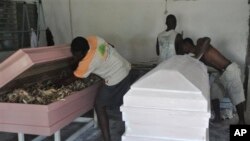While the West Africa Ebola outbreak did not start in Liberia, the country has been the hardest hit with the most cases and deaths. The group ActionAid says it’s not clear just how many cases of Ebola remain unaccounted for in the country.
ActionAid Country Director in Liberia Korto Williams said over the past week or so there’s been a sense of cautious optimism in the country. That’s because there have been fewer ambulance deliveries of Ebola patients to treatment centers. Williams warned it is a false sense of optimism. The outbreak is not slowing down in Liberia.
“While we’ve have fewer number of cases in the last week, we also know that we have about 18,000 plus contacts that are out there since March of this year. And the government of Liberia, with their partners, has been able to reach about 6,000. So, we know that there are people out there who are probable cases. And the only way that we can be, you know, confirmed that things are getting better is if you get the remaining 12,000 to testing centers. And that is not happening,” she said.
Contact tracing is an essential part of containing the outbreak. But it’s not easy to do. Health workers must trace all those who may have come into contact with those known to have or have had Ebola Virus Disease.
“For the moment, I think the situation is just a false lull," said Williams. "And sooner or later we’re going to have more cases.”
Her opinion is supported by the World Health Organization assessment that the number of cases in Liberia, Guinea and Sierra Leone continues to grow exponentially.
Williams said one of the problems in tracing contacts is that Ebola is surrounded by myths. Many people, despite awareness campaigns, still do not know the facts.
“The mode of transmission, the origin of Ebola, what does it mean for communities to get involved – and I think it’s really important that the work we do focuses on community involvement and community education,” she said.
She said some Liberians won’t even tell health workers how many family members live in their home. They fear that doing so somehow means that everyone in the home is going to die. This kind of myth – and this kind of fear – prevent health officials from learning the true scope of the outbreak.
The ActionAid Country Director said that the difference between Liberia and neighboring Sierra Leone is that Sierra Leone has a better understanding how many Ebola cases there are.
Williams said there’s a huge disconnect in Ebola awareness between the capital Monrovia and rural parts of the country. She added community radio stations and journalists can play a major role in ending ignorance about the disease.
“Someone in Monrovia may have sufficient information around: how to stop Ebola -- how to prevent Ebola. But people in other parts of Liberia will not know it. So, we’ll continue to have increasing numbers of Ebola cases outside of Monrovia and that is an issue,” said Williams.
William added that Liberia needs more doctors and health care workers. She would like to see the Liberian government issue a national call to all Liberian health care workers to come forward and help in the crisis. A lot more medical supplies, including protection suits, are also needed.
ActionAid has been directly involved in awareness efforts in four Liberian counties. It’s helping to train health workers and community leaders to conduct door to door awareness campaigns. It’s also supporting family members under quarantine.
Williams said the U.S.-built treatment units are helping to build confidence in the communities that medical care is available. But she thinks some of the money for those units could be better spent supporting Liberia’s health centers.
“They can go in – not only for Ebola – but also non-Ebola illnesses like malaria.”
The ActionAid official said one issue that must be addressed soon is the growing number of Ebola orphans in the country. She says it must be determined how to care for them.










